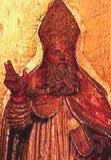January Saints
Born in Africa of a senatorial family, Fulgentius was at an early age appointed procurator of his province at Carthage. At the age of twenty-two, he resolved to embrace monastic life and was accepted into a monastery, renouncing all his goods on behalf of his mother and younger brother. He suffered much under Arian Vandal persecution.
Elected bishop of Ruspe in 508, he was shortly afterwards banished by the Arian king to Sardinia. He became the spokesman of his fellow bishop exiles and supported their orphaned flocks. By his books and letters, he confounded heretics, and strengthened the Catholics in Africa and Gaul.
On the death of the Arian king, Fulgentius went back to his see and worked to re-establish discipline. He died in peace in the year 533.
Saint Fulgentius, help us to face persecution with peace in our hearts.
(Sources: A new dictionary of saints. Comp. by Donald Attwater. Burns & Oates, Kent 1993; www.magnificat.ca/cal/engl/01-02.htm#fulgence)
(1845-1920)
Blessed Zygmunt Gorazdowski was born on 1 November 1845 in Sanok, Ukraine. His family lived their Catholic faith most seriously and Zygmunt grew up in a deeply religious environment which was not exempt from trials and suffering. As a child he was afflicted with a lung ailment which did not, however, prevent him from considering the needs of others and offering his help where he could. After finishing high school, having felt a call to the priesthood, he enrolled in the faculty of law in Lviv. At the end of his second year of law studies, he decided to enter the Latin Catholic Seminary in Lviv. He finished his studies, but his health was still poor, so he underwent two years of intensive therapy. He was ordained a priest on 21 July 1871.
For the first six years, Father Gorazdowski served as parish vicar and administrator in various parishes, giving himself totally to his priestly duties and works of charity. During an outbreak of cholera in one parish, he did all he could to help the sick and dying, even laying out the dead despite the great risk to his own health. Throughout his priesthood, he took great care to nurture the spiritual health of his parishioners, for whom he wrote and published a catechism and many other books to help parents, teachers and youth. He also set up many apostolic works for the poor and the suffering.
In 1877, Father Zygmunt began a 40-year stint in the parish of St Nicholas in Lviv. Here he served in many schools and founded the Bonus Pastor Association for priests. Above all else, his charity sparkled, especially for the needy and suffering. He opened a home and soup kitchen for the needy, a health care centre for the terminally ill and convalescents, an institute for poor seminarians, a home for single mothers and orphans, and St Joseph’s Polish-German Catholic School. In order to maintain and continue these works, he founded the religious Congregation of the Sisters of St Joseph on 17 February 1884. Father Zygmunt died in Lviv on 1 January 1920. Those who knew him called him the father of the poor and priest of the homeless. He was beatified on 26 June 2001 by Pope John Paul II.
The Sisters of St Joseph continue in the charism entrusted to them by their founder, working with the poor, sick and suffering.
Blessed Zygmunt, teach us to see Jesus in the poor and needy.
(Source: www.vatican.va/news_services/liturgy/saints/...)
 Saint Paul the Hermit (229-342)
Saint Paul the Hermit (229-342)
Saint Paul was born in Upper Egypt in about the year 229, and was orphaned at age fifteen. He was very rich and highly educated. Denounced by his pagan brother-in-law, Paul entered the desert, trusting God to supply his wants. His confidence was rewarded. Providence led him to where there was a palm tree offering fruit for food and a spring with water to drink. Here he found such delight in prayer and penance, he chose to stay and remained for the rest of his life in penance, prayer and contemplation.
God revealed Paul’s existence to Saint Anthony, another great hermit. When he found him, they knew each other at once, and praised God together. A raven brought them a loaf of bread, and Saint Paul said, “See how good God is! For sixty years this bird has brought me half a loaf each day; now at your coming, Christ has doubled the provision for His servants.”
The two passed the night in prayer and the next day Paul died.
Saint Paul, help us to seek and love time with God.
(Source: www.magnificat.ca/cal/engl/01-16.htm)


 Entries(RSS)
Entries(RSS)